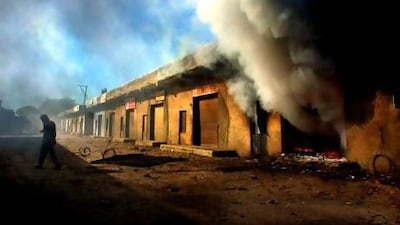NEW DELHI // A court verdict this week has brought into focus the puzzle of Narendra Modi, the chief minister of Gujarat and the most controversial politician in India.
Mr Modi is touted as the Bharatiya Janata Party's (BJP's) leading prime ministerial candidate for the 2014 general elections.
Yet his prospects to be India's leader are dogged by the shadow of horrific communal riots in his state in 2002.
Mr Modi, the chief minister of Gujarat since October 2001, has been accused by his opponents of deliberate inaction and even complicity in the riots, in which rampaging mobs killed between 1,000 and 2,000 people, most of them Muslim.
On Wednesday, a special court set up to hear cases from the riots, convicted 32 people of organising the massacre in February 2002 of 97 people in the Naroda Patiya suburb of Ahmedabad.
The killings were one of the most brutal chapters of the riots.
Among those convicted was Maya Kodnani, a BJP member of the Gujarat state legislature and, between 2007 and 2009, Mr Modi's minister for women and child development.
Ms Kodnani was allowed to stand for re-election in December 2002 by the state's BJP unit, despite allegations that she had led an armed mob during the riots earlier that year.
Mr Modi's continued association with the riots may prove problematic in the 2014 general elections, said a senior member of a party allied to the BJP, who wished to remain anonymous.
"If he's the prime ministerial candidate, and if a coalition government has to be formed, he won't be able to get any other party on board," the politician said.
Babu Bajrangi, a member of the Bajrang Dal, a Hindu right-wing group loosely allied with the BJP, was also convicted by the Supreme Court, based partly on a video from a sting operation.
The video, shot by the magazine Tehelka, showed Mr Bajrangi boasting about handing out guns to rioters, and about "not sparing anyone - women, children, anybody. Hit them, cut them, burn them."
After the judgment on Wednesday, Digvijaya Singh, a senior leader of India's ruling Congress party, said it was clear Ms Kodnani and the others convicted had "acted at the behest" Mr Modi.
"No ministers would be involved in such a crime unless they had the consent of the chief minister," Mr Singh said in a statement.
However, a BJP spokesman, Yatin Oza, said "the entire Gujarat unit of the BJP" was being unfairly tarred by Ms Kodnani's conviction.
In a rare interview with the Wall Street Journal, published on Wednesday, Mr Modi was asked whether he would apologise for the 2002 riots.
"One only has to ask for forgiveness if one is guilty of a crime," he replied. "If you think it's such a big crime, why should the culprit be forgiven? Just because Modi is a chief minister, why should he be forgiven? I think Modi should get the biggest punishment possible if he is guilty."
Since 2002, Mr Modi has positioned himself as a pro-business politician, often claiming that Gujarat had achieved extraordinary rates of economic growth under his leadership.
It was for this reason, Mr Oza said, that the BJP would rely on Mr Modi's record of good governance and progress when Gujarat goes to the polls later this year.
Comparisons have shown, however, that Gujarat's rate of growth between 2001 and 2010 was roughly similar to that of other major Indian states.
Madhav Nalapat, a professor of geopolitics at Manipal University and a current affairs columnist, said he did not think that the legacy of the 2002 riots would affect Mr Modi's electoral career in the near future.
"Ten years is a long time," he said. "The issues have shifted now, from communal relations to governance. I don't think one court verdict is going to bring it back to communal relations."
Mr Modi himself has been careful to not declare his prime ministerial ambitions outright.
To the Wall Street Journal, he said: "I live in the present. My present is my Gujarat, the 60 million people of this state, the villages, the poor farmers, the children - to change their destiny. I can't think beyond that."
Follow
The National
on
& Samanth Subramanian on

